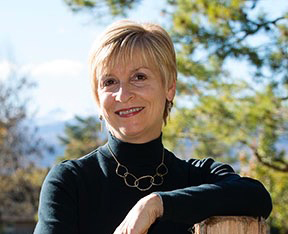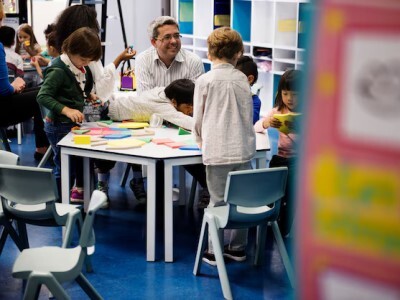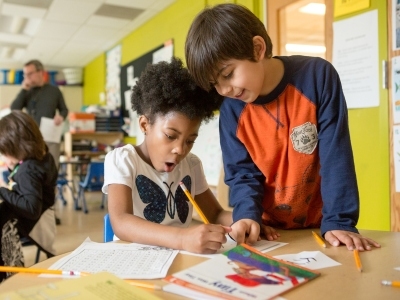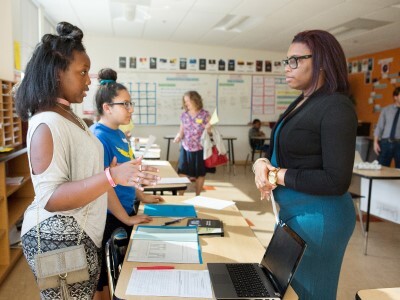Moving Forward to Transform Learning in Bullitt County, KY
Topics
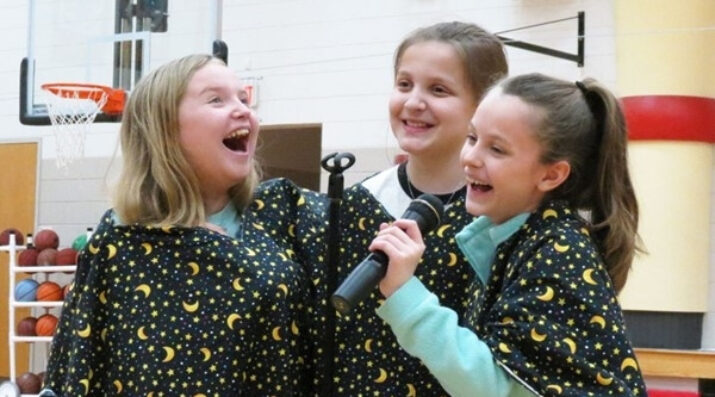
We’ve all had the experience of truly purposeful, authentic learning and know how valuable it is. Educators are taking the best of what we know about learning, student support, effective instruction, and interpersonal skill-building to completely reimagine schools so that students experience that kind of purposeful learning all day, every day.
Practitioner's Guide to Next Gen Learning
Bullitt County's schools are using their new graduate profile so students become not just college and career ready but life ready too.
“Status quo.” Latin for the mess we're in.
—Jeve Moorman
I do not tolerate the status quo very well.
—Adrienne Usher, assistant superintendent for student learning, Bullitt County Public Schools
The district motto for Bullitt County Public Schools (BCPS) in Shepherdsville, Kentucky, is “Moving Forward,” so it is fitting that, in spite of current challenges, they are forging ahead with their plans to transform learning in their schools. After engaging with their community to redefine student success for the 21st century, they have created a new graduate profile that encompasses the full range of knowledge and skills learners need for college, career, and life. In partnership with NGLC Services, district leaders and a self-selected cohort of innovative educators are now redesigning teaching and learning so that all BCPS students can thrive in a changing world.
For this edition of Friday Focus: Practitioner’s Guide to Next Gen Learning, I listened to Adrienne Usher, assistant superintendent for student learning at BCPS, as she talked about why she, along with Superintendent Jesse Bacon, are guiding the district and its community to rethink the nature and purpose of schools. As Jesse explains, “The demands of an emerging adult in today's society are so much different than it was ten or 15 years ago, so we have to think beyond content acquisition and truly give kids the types of experiences that will allow them to be prepared for life after school."
At BCPS, being ready for the future encompasses more than achieving personal success in college and career. According to Adrienne, being life ready is also about promoting equity, social justice, and contributing to the community, one of the six elements of the district's new graduate profile. In our conversation, Adrienne shared:
- Her personal why for choosing teaching as a career
- Her professional why for becoming a change agent at BCPS
- Reasons why BCPS is continuing to transform learning amidst the pandemic
- Insights from the experiences of this past semester
Why did you become an educator?
I was raised by a teacher who taught in Bullitt County, and as a child I spent my summers helping my mom get her room ready. When I was in late elementary school, the teachers went on strike—funding for education in Kentucky was an issue at this time. My mom took me on the bus to Frankfort up to the state capital. I remember hearing her talk on the phone with her teacher friends and seeing her always grading papers and calling parents at night.
So I spent my entire high school career saying I didn’t want to be a teacher. I originally started in business at [Western Kentucky University]. But then I did some summer internships, and it was like the business people around me had just had the life sucked out of them. I decided I could not spend the rest of my life doing something I did not care about.
There’s also some important historical context from me and my mom living and working here in Bullitt County. When I started in Kindergarten, Jefferson County—the next county over, which includes Louisville, where Breonna Taylor was killed—had only recently instituted busing for school desegregation. As a result, Bullitt County, like others in the area, experienced growth, predominantly white, to avoid busing and have the ability to attend neighborhood schools. Due to this, the county experienced little diversity for many years.
Today our district is more diverse. The county wants to be a leader in education, and to do that we must consider how much the world is changing. It’s time for schools to change. And it’s time for equity in our district.
What I do comes from deep inside me. I always go back to the Nelson Mandela quote, “Education is the most powerful weapon which you can use to change the world.” My personal why for education is that I have a moral imperative to do just that...change the world.
What professional experiences convinced you that education needed to change?
My first year as a teacher, I was hired in January to teach first grade in Bowling Green (KY). Our school had many refugees from the war in Bosnia and Croatia and had trailers out back for extra classrooms. Many of the students did not speak English, and no one on staff spoke their language. I was placed on a team of veteran teachers who had been teaching together for a long time. The instructional plan was to have our students sit in reading groups for two-and-a-half hours every day and have a written list of work from top to bottom on every inch of the board.
Now I knew I had been teaching for about five minutes, but I also knew this much: “This is not good for kids.” So the other new teacher and I created a reading workshop program with project-based learning elements. The veteran teachers reported us, and the principal came to my classroom. I thought I was going to be fired. That was a pivotal moment for me—I remember this like it was yesterday. I looked at him and said, “You hired me to impact children and change their lives. If you think that putting work all over the board is the right way, then this is probably not the place for me.” The principal said I had better make it work, and I did.
As a teacher and elementary counselor, I was always about bringing in new opportunities and programs for kids. I worked in high-poverty schools, partnering and collaborating with the community and business to create these opportunities for students. If we think that educators alone are the only providers of education, then we are not providing students with a well-rounded education. If we see ourselves as the only givers of knowledge, then we have to rethink and reflect on why students are not engaged. Instead of looking at things like distractions as an excuse for why kids are not motivated, let’s find and use student voice to enhance the educational experience for them.
Those first years of teaching made me realize that we had to create a better experience for kids and quit thinking about education in the old way. If we continue with the same mindset and expectations for teaching kids that many of us experienced as students, we are not equipping or preparing our students to survive and thrive in today's world.
Why is BCPS committed to transforming learning, even during these challenging times?
When I was a principal and then assistant superintendent, I asked myself, “What is our why as a district?” BCPS had made big gains under the previous administration in terms of test scores and accountability. College and career readiness was always a priority. We were at the top of the state in measures of college and career readiness, but what did those scores really mean? Were they successful three years or five years later? I knew we needed a bigger why. I don’t want students to be just college and career ready but life ready. What skills do they really have when they finish their K-12 journey?
The idea for a new graduate profile came out of our regional Ohio Valley Educational Cooperative (OVEC). Shortly after I became assistant superintendent (in 2017), the co-op hosted a session with Envision Learning Partners. I went to the training and then talked to the presenter, Alcine Mumby, for a long time about changing mindsets and about equity. Working on the graduate profile is some of the most exciting work I have ever been able to lead and be a part of as an educator. It was a challenge when the work started because our team had to work hard to understand and create new schema around the student experience in school.
Many times we had to stop ourselves and reflect so as to avoid trying to fit a square peg into the round hole of traditional education. At the same time, I knew coming up with a new definition of student success was the right work. This new way of thinking presented itself as a challenge, but in reality it was a new future for our Bullitt County students, staff, and community.
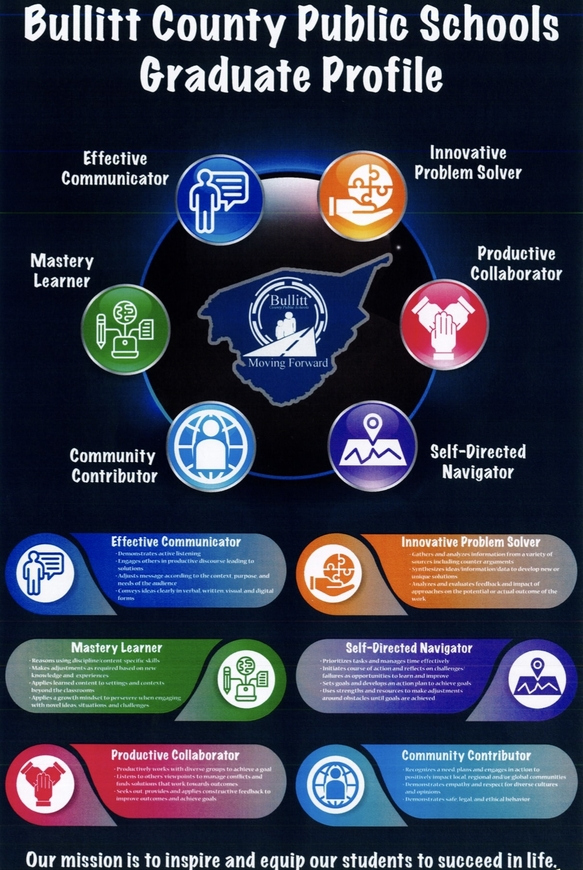
Co-Creating this broader definition of student success was an integral part of BCPS’s community-engaged strategic planning process. With support from CF Educational Solutions, BCPS strategic planning also included developing a new mission and core values, school board aspiration statements, and key district processes.
I do not tolerate the status quo very well. I am going to ask questions to understand the why and the impact for student success. As I said to Jesse when he came on as superintendent in 2018, “I am not good at being a yes person when it comes to students and their school experience...I will ask questions, push our thinking.” But he and I both want to make school better than what we had. The graduate profile is not just to help students but to transform the community and how we all think about the school experience.
The pandemic has shown us the inequities that exist and not just in education. It has shined a light on things we had an inkling of but did not think were as big an issue as we now know they are. For a while, it’s been like taking a flashlight into a dark room. Something terrible happens and suddenly you see a problem, but the rest of the room is still dark. You keep tripping in the darkness and wondering why. That dark room feels different now. A dimmer switch is coming on, and we are seeing so much more that we have to address.
I am convinced, now more than ever, that the historical and continued trauma related to Black communities creates even more urgency for a new definition of student success. It is a must, a moral imperative, for our students and future generations to be equipped with a deep understanding of social justice. The pandemic has brought terrible illness and death, but it’s also an opportunity to realize that traditional education does not meet the needs of many of our kids anymore and has to be reimagined. What if, like in the Leslie Dwight poem, 2020 is the year that forces us to wake up and band together and figure out what’s most important?
What “lessons learned” will you apply to reopening BCPS schools?
A lesson learned for me has come from the talk around learning gaps. All students have learning gaps in some form or fashion, but that cannot be the main message of “why” we have school. Deficit thinking is really frustrating for me. As educators, we have a tendency to look at “what does this kid not know?” If we see students coming to us only as a set of deficits, how are we going to help them fully develop? Why can’t we grow the child in their strengths as well as in their areas for improvement?
As we look back over our experience with NTI (Non-Traditional Instruction) this spring, we are discovering students’ strengths. We are talking to teachers about ways that competencies from the graduate profile came out in the ways kids worked. The level of self-direction, for example, especially at the secondary level. When you let kids direct their learning, we found they can do it. Or maybe we saw that a kid has a natural talent for problem-solving. Or collaboration. We can’t say we are transforming learning to be student-centered and in the same sentence say that students are coming back to school with extreme learning gaps. Students can do a lot more than we think or give them credit for.
As BCPS plans for next year’s in-person experiences and our new virtual academy option, we’re taking the strengths that we observed emerging naturally and embedding them into our instruction. There’s lots to work out, but whether it’s six feet apart in a classroom or virtual, we still want collaboration and discourse. We still want to provide experiences where students can be communicators and mastery learners. We also want to design for equity across both in-person and virtual environments.
Some of what we are piloting in the virtual academy can also be incorporated into the classroom. If I could give some advice, it would be, “Don’t think so binary about things. Real life is not binary. It’s always a combination of this and this and this.” We have a tendency to think in terms of A or B approaches, but why can’t we create something custom for our kids?
Change is going to happen whether we are ready or not; the time for change is now, and the pandemic tells us this.
Resources
- This collection of BCPS strategic planning graphics includes the new graduate profile and mission statement, Bullitt County Board of Education aspiration statements, and key components of both the strategic plan and the district’s process for developing it.
- The Bullitt County Public Schools Core Values, aligned to their new mission, reflect the district’s learner-centered and future-focused mindsets.
- This NTI Thinking-Focused Learning Structure provides a snapshot of what guided BCPS’s remote learning in the spring of 2020, including discourse, elements of experiential and project-based learning, and collaboration.
- “Adolescence in an Age of Accelerations,” the first part of NGLC’s MyWays Student Success Series, explores and documents the challenges facing young people today, including roadblocks to success in postsecondary education, significant and challenging changes to the career landscape, and persistent inequities in opportunities and outcomes among groups of students.
- “Success in a Changing World,” one of NGLC’s self-paced, online courses in the InspirEd platform (free with sign-up), provides professional learning, resources, and step-by-step guidance to educators who are ready to reimagine learner success with a “whole human” lens.
Photo and graphic courtesy of Bullitt County Public Schools.

